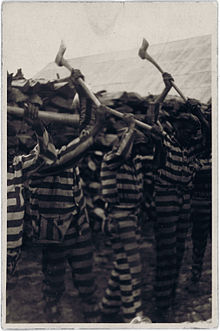
The field holler or field call is mostly a historical type of vocal work song sung by field slaves in the United States (and later by African American forced laborers accused of violating vagrancy laws) to accompany their tasked work, to communicate usefully, or to vent feelings.[1] It differs from the collective work song in that it was sung solo, though early observers noted that a holler, or ‘cry’, might be echoed by other workers. Though commonly associated with cotton cultivation, the field holler was also sung by levee workers, and field hands in rice and sugar plantations. Field hollers are also known as corn-field hollers, water calls, and whoops. An early description is from 1853 and the first recordings are from the 1930s. The holler is closely related to the call and response of work songs and arhoolies. The Afro-American music form ultimately influenced strands of African American music, such as the blues and thereby rhythm and blues, as well as negro spirituals.[2]
There had also been some instances where some white oat farmers in close proximity to black people in the southern United States adopted and employed the field holler.[3]
- ^ Maultsby, Portia. "A History of African American Music". Carnegie Hall. Archived from the original on 2012-07-14. Retrieved 2012-08-14.
- ^ Shaw, Arnold (1978). Honkers and Shouters: The Golden Years of Rhythm & Blues (First ed.). New York: Macmillan Publishing Company. p. 3. ISBN 0-02-061740-2.
- ^ Browne, Ray B. (1954). "Some Notes on the Southern "Holler"". The Journal of American Folklore. 67 (263): 73–77. doi:10.2307/536810. JSTOR 536810. Archived from the original on 2020-10-02. Retrieved 2020-12-02.